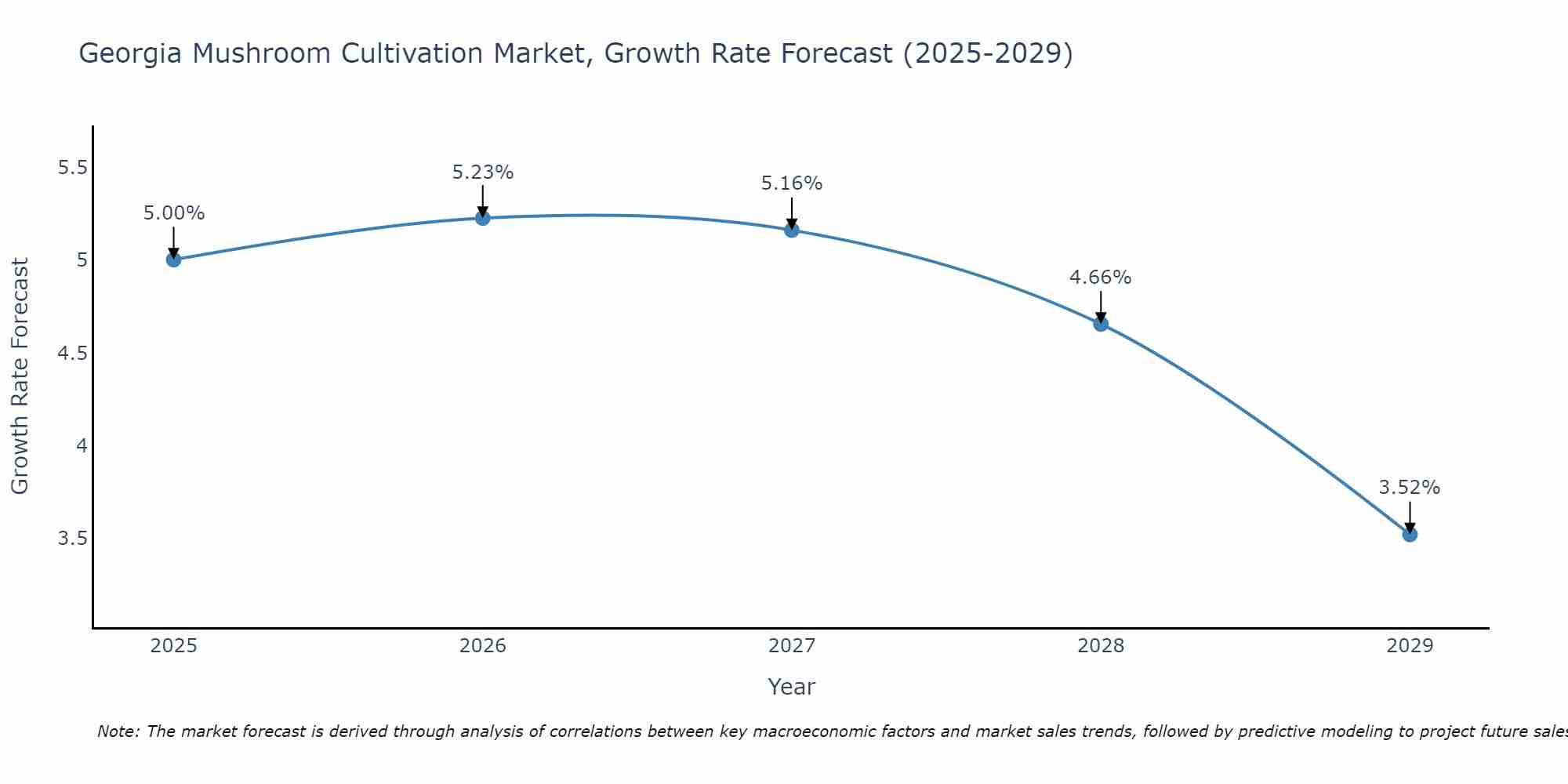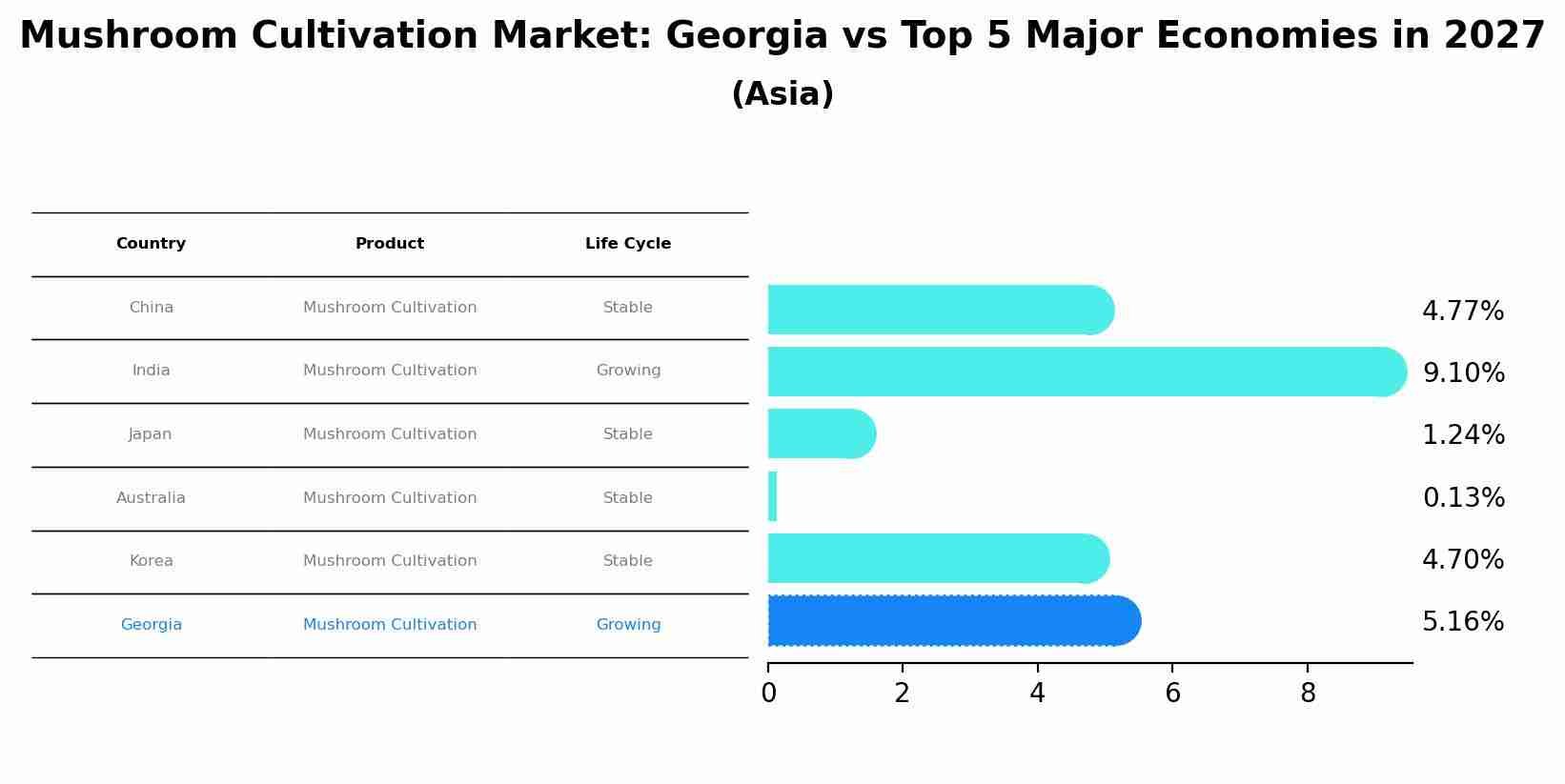Georgia Mushroom Cultivation Market (2025-2031) Outlook | Industry, Trends, Value, Growth, Share, Analysis, Size, Revenue, Companies & Forecast
| Product Code: ETC383160 | Publication Date: Aug 2022 | Updated Date: Apr 2025 | Product Type: Market Research Report | |
| Publisher: 6Wresearch | Author: Ravi Bhandari | No. of Pages: 75 | No. of Figures: 35 | No. of Tables: 20 |
Georgia Mushroom Cultivation Market Size Growth Rate
The Georgia Mushroom Cultivation Market is projected to witness mixed growth rate patterns during 2025 to 2029. Starting at 5.00% in 2025, the market peaks at 5.23% in 2026, and settles at 3.52% by 2029.

Mushroom Cultivation Market: Georgia vs Top 5 Major Economies in 2027 (Asia)
The Mushroom Cultivation market in Georgia is projected to grow at a growing growth rate of 5.16% by 2027, within the Asia region led by China, along with other countries like India, Japan, Australia and South Korea, collectively shaping a dynamic and evolving market environment driven by innovation and increasing adoption of emerging technologies.

Georgia Mushroom Cultivation Market Overview
The Georgia mushroom cultivation market focuses on the production, distribution, and consumption of cultivated mushrooms for food, medicinal, and industrial applications. Mushroom cultivation involves the controlled growth of fungal species such as button mushrooms, shiitake mushrooms, oyster mushrooms, and medicinal mushrooms in indoor facilities or outdoor environments using substrate materials such as compost, sawdust, or agricultural residues. In Georgia, the mushroom cultivation market serves mushroom farmers, food processors, health supplement manufacturers, and pharmaceutical companies, offering a variety of mushroom species and products such as fresh mushrooms, dried mushrooms, mushroom extracts, and mushroom-based supplements. With Georgia agricultural resources, favorable climate, and growing interest in healthy and sustainable foods, the mushroom cultivation market is expected to see continued growth, driven by demand for nutritious, flavorful, and environmentally friendly mushroom products.
Drivers of the market
The Georgia mushroom cultivation market is primarily driven by the growing demand for nutritious and sustainable food sources. Mushroom cultivation involves growing edible fungi for consumption or commercial purposes. With Georgia agricultural diversity and favorable climate conditions, there is a potential for mushroom cultivation as a profitable agribusiness venture. Factors such as increasing health awareness, culinary trends, and the popularity of plant-based diets drive market growth in Georgia mushroom cultivation sector.
Challenges of the market
The Georgia Mushroom Cultivation Market faces challenges related to production efficiency, quality control, and market competition. Mushroom growers must navigate challenges such as substrate sourcing, disease management, and labor availability to ensure consistent yields and product quality. Additionally, addressing concerns about food safety, traceability, and market access poses challenges. Moreover, market competition from domestic and international mushroom producers and the need for innovation in cultivation techniques and packaging add complexity to this sector, requiring continuous improvement and collaboration with agricultural researchers and industry associations to address emerging challenges and capitalize on market opportunities.
Government Policy of the market
In support of agriculture diversification and sustainable food production, the Georgia government has implemented policies to promote the mushroom cultivation market. These policies may include agricultural extension programs, research funding for mushroom cultivation techniques, and incentives for farmers to adopt mushroom farming as a profitable and environmentally friendly agricultural practice in Georgia.
Key Highlights of the Report:
- Georgia Mushroom Cultivation Market Outlook
- Market Size of Georgia Mushroom Cultivation Market, 2024
- Forecast of Georgia Mushroom Cultivation Market, 2031
- Historical Data and Forecast of Georgia Mushroom Cultivation Revenues & Volume for the Period 2021-2031
- Georgia Mushroom Cultivation Market Trend Evolution
- Georgia Mushroom Cultivation Market Drivers and Challenges
- Georgia Mushroom Cultivation Price Trends
- Georgia Mushroom Cultivation Porter's Five Forces
- Georgia Mushroom Cultivation Industry Life Cycle
- Historical Data and Forecast of Georgia Mushroom Cultivation Market Revenues & Volume By Type for the Period 2021-2031
- Historical Data and Forecast of Georgia Mushroom Cultivation Market Revenues & Volume By Button Mushroom for the Period 2021-2031
- Historical Data and Forecast of Georgia Mushroom Cultivation Market Revenues & Volume By Oyster Mushroom for the Period 2021-2031
- Historical Data and Forecast of Georgia Mushroom Cultivation Market Revenues & Volume By Shiitake Mushroom for the Period 2021-2031
- Historical Data and Forecast of Georgia Mushroom Cultivation Market Revenues & Volume By Others for the Period 2021-2031
- Georgia Mushroom Cultivation Import Export Trade Statistics
- Market Opportunity Assessment By Type
- Georgia Mushroom Cultivation Top Companies Market Share
- Georgia Mushroom Cultivation Competitive Benchmarking By Technical and Operational Parameters
- Georgia Mushroom Cultivation Company Profiles
- Georgia Mushroom Cultivation Key Strategic Recommendations
Frequently Asked Questions About the Market Study (FAQs):
- Single User License$ 1,995
- Department License$ 2,400
- Site License$ 3,120
- Global License$ 3,795
Search
Thought Leadership and Analyst Meet
Our Clients
Related Reports
- Canada Oil and Gas Market (2026-2032) | Share, Segmentation, Value, Industry, Trends, Forecast, Analysis, Size & Revenue, Growth, Competitive Landscape, Outlook, Companies
- Germany Breakfast Food Market (2026-2032) | Industry, Share, Growth, Size, Companies, Value, Analysis, Revenue, Trends, Forecast & Outlook
- Australia Briquette Market (2025-2031) | Growth, Size, Revenue, Forecast, Analysis, Trends, Value, Share, Industry & Companies
- Vietnam System Integrator Market (2025-2031) | Size, Companies, Analysis, Industry, Value, Forecast, Growth, Trends, Revenue & Share
- ASEAN and Thailand Brain Health Supplements Market (2025-2031) | Strategy, Consumer Insights, Analysis, Investment Trends, Opportunities, Growth, Size, Share, Industry, Revenue, Segments, Value, Segmentation, Supply, Forecast, Restraints, Outlook, Competition, Drivers, Trends, Demand, Pricing Analysis, Competitive, Strategic Insights, Companies, Challenges
- ASEAN Bearings Market (2025-2031) | Strategy, Consumer Insights, Analysis, Investment Trends, Opportunities, Growth, Size, Share, Industry, Revenue, Segments, Value, Segmentation, Supply, Forecast, Restraints, Outlook, Competition, Drivers, Trends, Demand, Pricing Analysis, Competitive, Strategic Insights, Companies, Challenges
- Europe Flooring Market (2025-2031) | Outlook, Share, Industry, Trends, Forecast, Companies, Revenue, Size, Analysis, Growth & Value
- Saudi Arabia Manlift Market (2025-2031) | Outlook, Size, Growth, Trends, Companies, Industry, Revenue, Value, Share, Forecast & Analysis
- Uganda Excavator, Crane, and Wheel Loaders Market (2025-2031) | Strategy, Consumer Insights, Analysis, Investment Trends, Opportunities, Growth, Size, Share, Industry, Revenue, Segments, Value, Segmentation, Supply, Forecast, Restraints, Outlook, Competition, Drivers, Trends, Demand, Pricing Analysis, Competitive, Strategic Insights, Companies, Challenges
- Rwanda Excavator, Crane, and Wheel Loaders Market (2025-2031) | Strategy, Consumer Insights, Analysis, Investment Trends, Opportunities, Growth, Size, Share, Industry, Revenue, Segments, Value, Segmentation, Supply, Forecast, Restraints, Outlook, Competition, Drivers, Trends, Demand, Pricing Analysis, Competitive, Strategic Insights, Companies, Challenges
Industry Events and Analyst Meet
Whitepaper
- Middle East & Africa Commercial Security Market Click here to view more.
- Middle East & Africa Fire Safety Systems & Equipment Market Click here to view more.
- GCC Drone Market Click here to view more.
- Middle East Lighting Fixture Market Click here to view more.
- GCC Physical & Perimeter Security Market Click here to view more.
6WResearch In News
- Doha a strategic location for EV manufacturing hub: IPA Qatar
- Demand for luxury TVs surging in the GCC, says Samsung
- Empowering Growth: The Thriving Journey of Bangladesh’s Cable Industry
- Demand for luxury TVs surging in the GCC, says Samsung
- Video call with a traditional healer? Once unthinkable, it’s now common in South Africa
- Intelligent Buildings To Smooth GCC’s Path To Net Zero


















